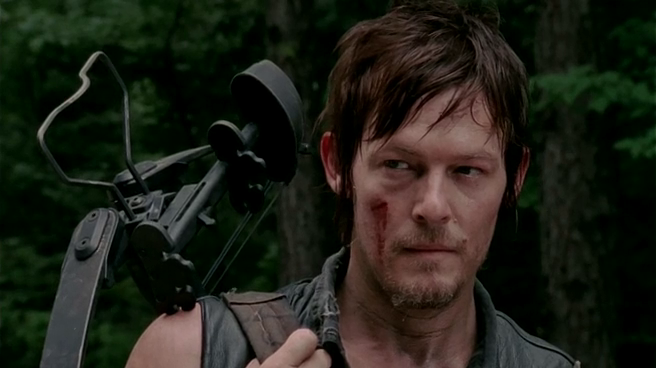Stages of Grief
"I'm just tired of losing people." — Daryl Dixon, "The Walking Dead"
Grief and guilt manifest differently for different people. One of the things I credit "The Walking Dead" for in the back half of season four is the bold choice to explore inter-personal dynamics, themes, and emotional issues. That is something many have said isn't a part of this world, but the show has decided something else. Through four episodes of the back half of the season, all we've seen is the way the events of the mid-season finale have impacted these people emotionally and psychologically.
Daryl and Beth probably seem like an odd pairing. But in an episode that focused exclusively on them Sunday we saw how enriching the odd coupling can be. Daryl spent a lot of time angry and grunting, while Beth was on a quest for alcohol — something she'd never had. It turned out that both behaviors were the result of a manifestation of grief and guilt.
It's not surprising that Beth is in a state of grief. She saw her father killed, lost track of the baby in her charge, and believes her sister is dead, too. Or at least fears she might be. Beth had a more traditional, conservative upbringing. Seeing as how none of that has helped her lead a quiet life, she decides it's high time to try drinking. It's her way of coping with the loss she's suffered, and her struggle to find hope in a desperate, hopeless situation.
Turns out Daryl is in the same boat, and that makes sense. No character has had a more positive, life-affirming arc than Daryl. At the outset he's kind of a hillbilly loner, living in the shadow of his mean and vindictive brother, Meryl. Turns out that pretty much summed up Daryl's life before the zombie apocalypse.
But in the group dynamic, he found a new role and a new identity. He was a rock others could count on, and he became a leader and protector. How great the loss, then, must have felt as he watched the world of the prison crumble. Early in the season Daryl lamented the losses of friends and those in his charge. But in one moment, as the Governor's forces busted down the walls, Daryl saw all he'd fought to protect and build crash down.
His deep confession of guilt and grief was one of the most moving moments the show has had, and perhaps one of the most honest. Daryl was grieved because those he was to care for and protect had fallen. He had guilt because he survived. And he was lost because his identity was wrapped up in a group dynamic that imploded. His answer was to slip back to comfortable, familiar routines of behavior that he'd known all his life.
But Beth challenges that line of thinking for two reasons. First, she still needs him, so his purpose hasn't ended. Second, the way to honor those that have been lost is not to regress, but rather to push on and honor their memory and sacrifice.
I think that's sage advice for us all, even though we aren't in the midst of a zombie apocalypse. We have a tendency to turn our grief and guilt inward, to regress. But that doesn't honor those we've lost. Hopefully it's something Daryl will embrace as he finds new hope and new focus in a world continuing to spiral out of control.




Comments
Post a Comment